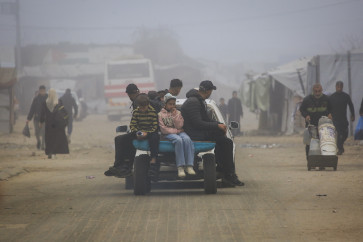Popular Reads
Top Results
Can't find what you're looking for?
View all search resultsPopular Reads
Top Results
Can't find what you're looking for?
View all search resultsAdvertising campaign coverage unbalanced: Experts
Polling watchdog: A volunteer for the Election Supervisory Board (Bawaslu) holds up a sticker at a public gathering in Semarang, Central Java, on Monday
Change text size
Gift Premium Articles
to Anyone
Polling watchdog: A volunteer for the Election Supervisory Board (Bawaslu) holds up a sticker at a public gathering in Semarang, Central Java, on Monday. The sticker calls for intensive public supervision of the elections, and instructs the public to report any breaches in the election process to Panwaslu. Antara/Rekotomo
While the open campaign period officially opened last Monday and election hype is increasing with 38 political parties beginning to hold mass gatherings around the city, the hustle and bustle of the elections started a long time ago.
Whichever TV station we switch to, we see party ads attempting to persuade eligible voters to choose them on April 9. However, the frequency of the commercials and the length of news on rivaling parties appears to differ depending on how much money parties have been willing to spend.
Many parties have complained to the Press Council that TV stations are not "neutral" in broadcasting news and allocating coverage of campaign activities - favoring only selected parties.
If found guilty of blocking certain slots for activities of incumbent politicians, TV stations would be charged for violating the 2002 broadcasting law, Press Council member Abdullah Alamudi said.
"Some political parties have also complained that certain TV stations have allocated more time for their owners or for politicians closely related to their owners during activities including speaking to an audience," Abdullah told reporters at the opening of an election press freedom center, in Jakarta on Thursday. The center was established by the Alliance of Independent Journalists (AJI).
The launching ceremony was also attended by executives of parties including the Golkar Party, the Indonesian Democratic Party of Struggle (PDI-P), the People's Conscience Party (Hanura) and the Great Indonesia Movement Party (Gerindra).
Election Supervisory Board (Bawaslu) member Bambang Eko Cahyadi said parties should be given equal opportunities to promote themselves through advertising in the media, including TV stations.
"However, only a few *of the 38 parties* can afford to advertise widely because of limited funds," Bambang said.
A 30-second TV commercial, for example, can cost up to Rp 20 million (US$1,667) depending on what time of day it is to be broadcast and on which TV channel it will be aired. But the frequency of news coverage and advertising content are not only issues for TV stations, Bambang said. The media in general, including print and electronic outlets, must pay close attention to Law No. 10/2008 on general elections, because this law contains some ambiguity, he said.
Chapter 5 of the law, for instance, states that printed and electronic media is forbidden from publishing news, advertisements or the track records of political parties or politicians during the "silence period".
"I was surprised that the article places news and advertisements together in the same sentence. We know that the two are totally different," Bambang said.
"This law will cause serious problems for press freedom during the election period," Bambang said.
The media should continue to provide information to the public, Abdullah said.
"The media have to do their job professionally because they serve the public, not political parties, election committees or the election supervisory board," Abdullah said.
"We have to consider public rights, which cannot be ignored. These are most important," he said.
The managing editor of the vivanews.com portal, Nezar Patria, said his company would continue to cover election stories during the silence period (April 6 to April 8).
"We will not run stories on political parties during the silence period because we have to support the elections. But, as part of the media we must keep running stories on the elections because the people need *this information*," Nezar said.
MetroTV News chief Elman Saragih said his station would respect the law by stopping news broadcasts of campaign stories.
"The campaign period has given us enough time to criticize and appreciate contesting parties," Elman said.
During the silence period, Metro - as an election channel TV station - would air important stories related to the developments and the preparations for the election.
"We can, for instance, run stories on election logistics, polling stations and selected political educational items for voters," Elman said. (naf)










